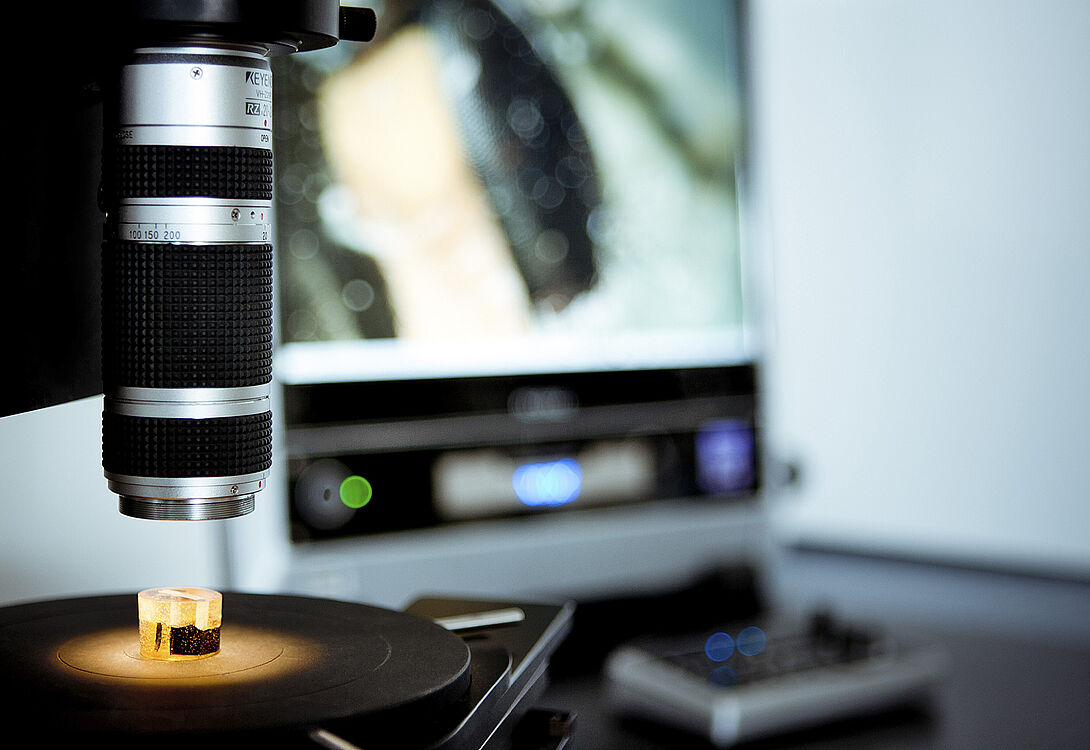Analysis
Kunststofftechnik Paderborn offers you a comprehensive range of different tests in the field of mechanical testing technology to assess material behavior under practical conditions. Depending on the issue at hand, the KTP can support you with the following test methods:
Optical analysis

- Component imaging using a computer tomograph
- Detection of voids, defects etc.
- Determination of fibre orientation in fibre-reinforced plastics
- Determination of porosity in foamed or additively manufactured components
- Microscopic analyses (digital microscope)
- Transmitted and incident light methods
- Polarised light
- Heatable sample table
- Particle size measurement
- image analysis
- Photo and video recordings
- Non-contact inspection of surface properties (laser microscope)
- Colour measurements (Minolta colour measuring device)
- Measuring device for samples up to 20x30 mm
- Gloss measurement, stress optics, refractive index determination
- Reflectance and transmission curves (DIN EN ISO 13468)
- 380-780 nm
- Contact angle measurement (DIN 55660)
- Fibre length distribution (with high-resolution scanner)
- incl. annealing residue
- Infrared spectroscopy (FTIR via ATR)
Rheometry
- Mass and volume melt flow index (MFR / MVR) (DIN EN ISO 1133)
- Spiral flow test
- Viscosity determination on a high-pressure capillary rheometer (DIN 53014)
- Determination of solution viscosity (PET, PA, PBT, PC)
- Viscosity determination for rubber compounds on the online extrusion rheometer
- Recording a vulcameter curve / cross-linking isotherms for rubber compounds on the Rubber Process Analyser (RPA, DIN EN ISO 6502)
- Determination of dynamic parameters for rubber compounds (storage and loss modulus)
- Determination of macromolecular damage (degradation of viscosity) of polymers on a shear cup
Thermal analysis

- Differential Scanning Calorimetry (DSC) (DIN EN ISO 11357)
- Heat conversion, crystallinity, crystallite melting range
- Glass transition temperature, oxidation stability, reaction kinetic data
- Specific heat
- enthalpy
- Thermomechanical analysis (TMA) (ISO 11359)
- Change in length under dynamic or static load
- Dynamic or static tensile tests
- Thermogravimetric analysis (TGA) (DIN EN ISO 11358)
- Weight changes and reaction kinetic data
- at constant or increasing temperature
- Determination of the thermal diffusivity and thermal conductivity of solids and melts (DIN EN ISO 22077)
- Vicat softening temperature (DIN EN ISO 306)
- HDT heat deflection temperature (DIN EN ISO 75)
- Burning behaviour
- DIN 75200, UL94 (V0, V1, V2, HB40, HB75, VTM0, VTM1, VTM2, 5VA, 5VB)
- Residue on ignition (DIN EN ISO 3451)
Mechanical testing

- Bending test (DIN EN ISO 178)
- Three-point and four-point loading with electrical force and deflection measurement, force-deflection diagram, incl. bending modulus up to 10kN (-80 - 250 °C)
- Tensile test (DIN EN ISO 527)
- Force measuring range 0-1 kN, 0-5 kN, 0-10 kN, 0-50 kN, determination of modulus of elasticity, incl.: fine and coarse extension measuring device, electronic extension and force measurement, stress-strain diagram
- Nitrogen cooling of the temperature chamber from -80 °C to room temperature
- Heating of the temperature chamber from room temperature to +250 °C
- Long-term testing with media insert
- Fatigue tests on an ElectroPuls E10000 dynamic testing system
- Testing the adhesion of thermoplastic elastomers to substrates (VDI 2019)
- Impact bending test (DIN EN ISO 179 and 180)
- 0-5 J; 2.93 m Impact velocity
- 0-50 J; 3.85 m Impact velocity
- Impact tensile test (DIN EN ISO 8256)
- Abrasion test (DIN 53754)
- Ball indentation hardness (ISO 2039)
- Shore hardness (Shore A, Shore D, DIN ISO 7619)
- Determination of granulate friction coefficients
Physical testing
- Density determination
- Buoyancy method (DIN EN ISO 1183)
- Determination of bulk density (DIN EN ISO 60)
- Density determination of plastic melts with high-pressure capillary rheometer (pvT)
- Surface properties with different probes (DIN EN ISO 4287)
- Roughness, waviness, sink marks, grooves, elevations
- Sieve and wet sieve analysis (DIN 53477)
- Determination of particle size distribution using the QicPic analyser
- Moisture determination (CaH2 method)
- Moisture determination (Karl Fischer titration)
- Stress crack analysis (PC, PMMA, PS, ASA, ABS, SAN)
- Determination of the particle size distribution of carbon black particles in rubber compounds using a dispersion tester
